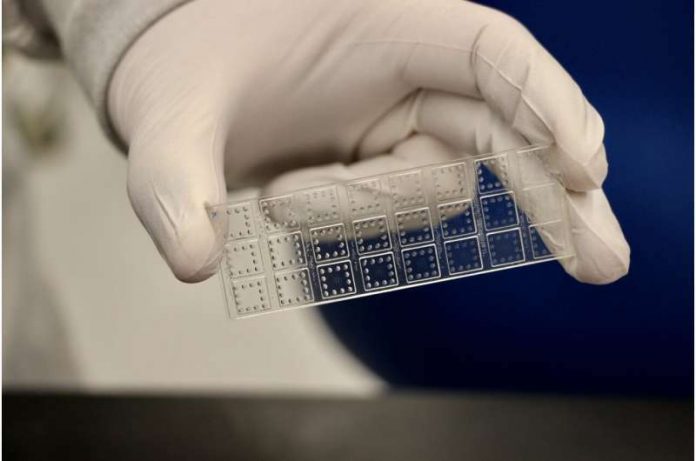
In a new study from Duke University, researchers developed a test that can quickly and easily assess how well a person’s neutralizing antibodies fight infection from multiple variants of COVID-19 such as Delta and the newly discovered Omicron variant.
This test could potentially tell doctors how protected a patient is from new variants and those currently circulating in a community or, conversely, which monoclonal antibodies to treat a COVID-19 patient.
The researchers have dubbed their test the COVID-19 Variant Spike-ACE2-Competitive Antibody Neutralization assay, or CoVariant-SCAN for short.
The test’s technology hinges on a polymer brush coating that acts as a sort of non-stick coating to stop anything but the desired biomarkers from attaching to the test slide when wet.
The high effectiveness of this non-stick shield makes the test incredibly sensitive to even low levels of its targets.
The approach allows researchers to print different molecular traps on different areas of the slide to catch multiple biomarkers at once.
In this application, researchers print fluorescent human ACE2 proteins—the cellular targets of the virus’s infamous spike protein—on a slide.
They also print spike proteins specific to each variant of COVID-19 at different specific locations.
When the test is run, the ACE2 proteins detach from the slide and are caught by the spike proteins still attached to the slide, causing the slide to glow.
But in the presence of neutralizing antibodies, the spike proteins are no longer able to grab onto the ACE2 proteins, making the slide glow less, indicating the effectiveness of the antibodies.
By printing different variants of the COVID-19 spike protein on different portions of the slide, researchers can see how effective the antibodies are at preventing each variant from latching onto their human cellular target simultaneously.
Typical current approaches require isolating live virus and culturing cells, which can take 24 hours or more and requires a wide variety of safety precautions and specially trained technicians.
The CoVariant-SCAN, in contrast, does not require a live virus, is easy to use in most settings and takes less than an hour—potentially just 15 minutes—to produce accurate results.
If you care about COVID vaccines, please read studies about this new COVID-19 vaccine can give the body ‘border protection’ and findings of Pfizer vaccine may protect against COVID variants in these people.
For more information about COVID vaccines and your health, please see recent studies about these old vaccines can fight COVID-19 pandemic and results showing that one dose of Pfizer vaccine may effectively protect people who’ve had COVID.
The study is published in the journal Science Advances. One author of the study is Cameron Wolfe.
Copyright © 2021 Knowridge Science Report. All rights reserved.



